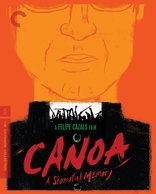Canoa: A Shameful Memory Blu-ray Movie
HomeCanoa: A Shameful Memory Blu-ray Movie 
Criterion | 1976 | 115 min | Not rated | Mar 14, 2017Movie rating
7.2 | / 10 |
Blu-ray rating
| Users | 0.0 | |
| Reviewer | 4.0 | |
| Overall | 4.0 |
Overview
Canoa: A Shameful Memory (1976)
A group of urban university employees on a hiking trip are viciously attacked by residents of the village of San Miguel Canoa who had been manipulated by a corrupt priest into believing the travelers were communist revolutionaries. The film is based on a reportedly real incident which took place in 1968.
Starring: Enrique Lucero, Ernesto Gómez Cruz, Rodrigo Puebla, Salvador Sánchez (I), Manuel OjedaNarrator: Juan López Moctezuma
Director: Felipe Cazals
| Foreign | 100% |
| Drama | 75% |
| Crime | Insignificant |
| Thriller | Insignificant |
Specifications
Video
Video codec: MPEG-4 AVC
Video resolution: 1080p
Aspect ratio: 1.85:1
Original aspect ratio: 1.85:1
Audio
Spanish: LPCM Mono (48kHz, 24-bit)
Subtitles
English SDH
Discs
Blu-ray Disc
Single disc (1 BD)
Playback
Region A (locked)
Review
Rating summary
| Movie | 4.0 | |
| Video | 5.0 | |
| Audio | 5.0 | |
| Extras | 3.0 | |
| Overall | 4.0 |
Canoa: A Shameful Memory Blu-ray Movie Review
Reviewed by Dr. Svet Atanasov March 26, 2017Winner of Silver Bear Award at the Berlinale, Felipe Cazals' "Canoa: A Shameful Memory" (1976) arrives on Blu-ray courtesy of Criterion. The supplemental features on the disc include new video introduction by director Guillermo del Toro; original trailer for the film; and new filmed conversation between directors Felipe Cazals and Alfonso Cuaron. The release also arrives with an an illustrated leaflet featuring Fernanda Solorzano's essay "The Devil in Disguise" and technical credits. In Spanish, with optional English subtitles for the main feature. Region-A "locked".
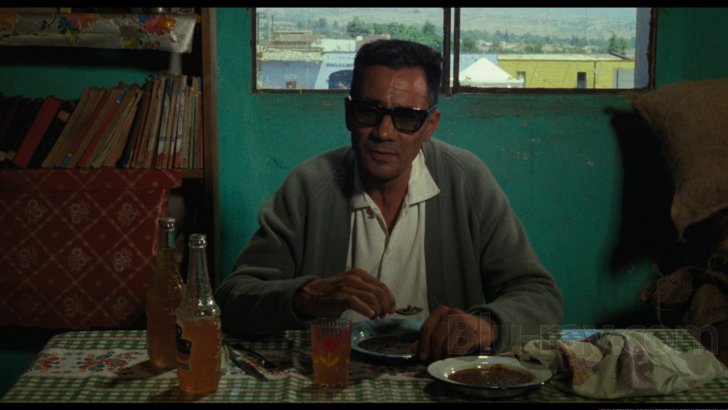
The man who spoke to them
I wonder how young Mexicans that will discover Felipe Cazals’ film some forty years after it was completed would react to it. It is a brutal film that supposedly accurately recreates a horrific event, which in turn inspired mass protests that ultimately led to an even larger tragedy, but it does not intentionally seek to play with the emotions of its audience. Rather, much like an objective documentary, it seeks to understand what caused the event. So I wonder if young Mexicans would conclude that the film made a difference, and if it did, exactly what type of difference?
Since viewing the film a couple of nights ago, I’ve had three different reactions. My initial reaction was a predictable one -- I was shocked that what the film shows did happen. The story is so simple yet so disturbing that it actually seems grotesquely amateurish, almost perfect for one of those wacky exotic adventure/exploitation films that Italian directors loved to shoot in the early ‘80s. So I assumed that after the inevitable outrage the film probably made a positive difference.
My second reaction was to draw parallels between the socio-political environment that the film carefully describes and the one that Mexicans are living in today. I wondered what had changed, and this time the more I thought about it, the more I struggled to see a positive difference. I could be wrong, but the news reports that have been coming out of Mexico in recent years have made it fairly clear that the local drug cartels are now so powerful that they actually control entire regions of the country -- and many are rural regions, just like the one that Cazals’ film visits. Apparently for the majority of the people living there the government in Mexico City is once again a foreign entity that is neither willing to listen to them nor capable of restoring order, so as in Cazals’ film they once again listen to local demagogues, shady businessmen, and powerful drug lords and their henchmen.
Now that I have had even more time to think about the film, I am absolutely convinced that people with the proper resources in Mexico should try to have this beautiful new restoration back in local cinemas and urge young Mexicans to go see it. The film shocked me and then forced me to think about the past and present of their country for days, so perhaps it can inspire them to actually do something that will change it for the better. Why not? If even only half of what the news networks are reporting is true, then it is painfully obvious that the exact same dangerous vacuum that Cazals’ film describes exists today but on a grander scale.
I am intentionally avoiding discussion of the true story as I think that the film will have a greater impact on you if you see it unaware of exact historic details -- though there is plenty that has been written about it so chances are you already know a lot -- but I wish to mention a few things about its style. Though the period atmosphere is of course very different, Cazals gradually infuses his film with the cold intensity that many of Costa-Gavras’ early films are known for (The Confession, State of Siege). On the other hand, the simple camerawork, utilization of unfiltered light, and especially the manner in which raw emotions and violence are captured give the film a naturalistic appearance that very much reminds of Spanish director Carlos Saura’s early work (The Delinquents, The Hunt).
Canoa: A Shameful Memory Blu-ray Movie, Video Quality 
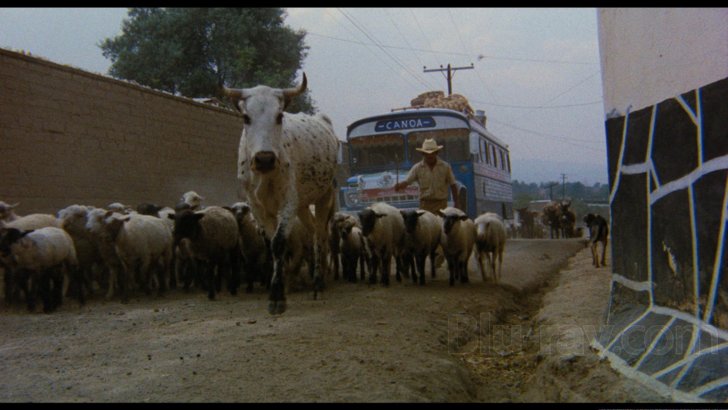
Presented in its original aspect ratio of 1.85:1, encoded with MPEG-4 AVC and granted a 1080p transfer, Felipe Cazals'
Canoa: A Shameful Memory arrives on Blu-ray courtesy of Criterion.
The following text appears inside the leaflet provided with this Blu-ray release:
"Supervised by director Felipe Cazals, this new digital transfer was created in 4K resolution on an Oxberry wet-gate film scanner from the 35mm original camera negative. Thousands of instances of dirt, debris, scratches, splices, and warps were manually removed using MTI Film's DRS, while Digital Vision's Phoenix was used for jitter, flicker, small grain and noise management. The 35mm original soundtrack negative was transferred using the Chase Optical Sound Processor. the monaural soundtrack was then remastered; clicks, thumps, hiss, hum, and cracks were manually removed using Pro Tools HD and iZotope RX.
Transfer supervisors: Lee Kline, Felipe Cazals.
Colorist: Roman Hankewycz/Harbor Picture Company, New York.
Scanning: Cineric, New York.
Audio Transfer: Audio Services, Burbank, CA."
While I have not previously seen Canoa: A Shameful Memory on DVD, there is no doubt in my mind that the new 4K restoration represents a tremendous upgrade in quality, and that the Blu-ray release will remain the film's definitive presentation on the market. The film looks quite remarkable in high-definition -- it is very healthy, vibrant, and boasting the type of density and fluidity that only excellent recent 4K masters are capable of producing. This type of consistently in all major areas we address in our reviews is somewhat surprising because the film's stylistic appearance is actually defined by the notably liberal use of unfiltered light and natural light/shadow nuances that could be quite difficult to reproduce. Colors are also very healthy and superbly balanced. There are no traces of problematic degraining or sharpening adjustments, though there are a few areas where grain can appear slightly over/underexposed depending on how light is captured by the camera. Lastly, there are no stability issues, or other purely age-related imperfections to report in our review. (Note: This is a Region-A "locked" Blu-ray release. Therefore, you must have a native Region-A or Region-Free player in order to access its content).
Canoa: A Shameful Memory Blu-ray Movie, Audio Quality 
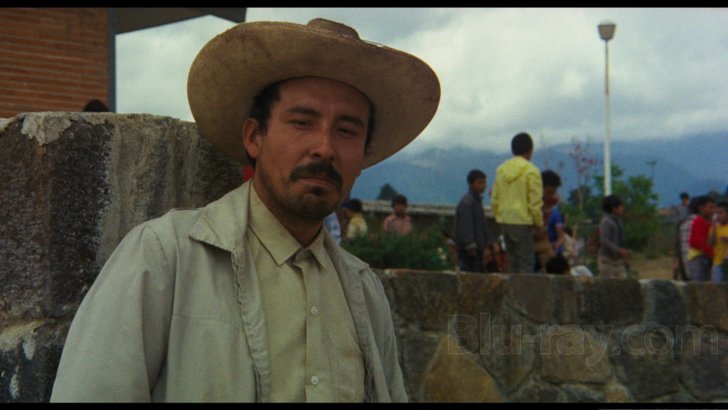
There is only one standard audio track on this Blu-ray release: Spanish LPCM 1.0. Optional English SDH subtitles are provided for the main feature.
The film does not have a prominent music score and relies almost entirely on organic sounds and noises to build and sustain a specific atmosphere. Rather predictably, dynamic intensity is quite modest. (There are a few segments where radio music can be heard). Balance is excellent, though occasionally some very minor fluctuations that are part of the film's original sound design can be identified.
Canoa: A Shameful Memory Blu-ray Movie, Special Features and Extras 
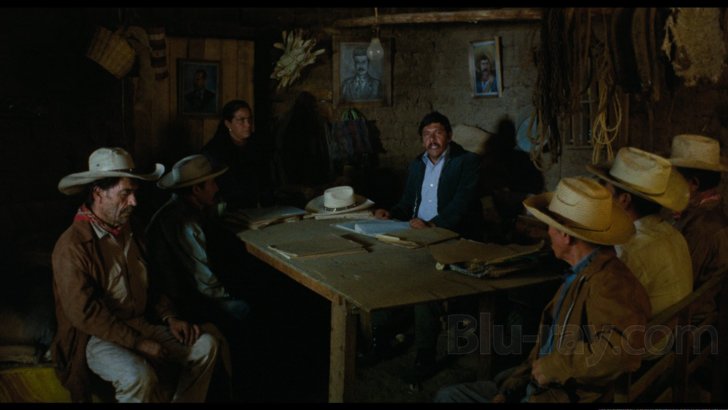
- Guillermo del Toro Introduction - acclaimed director Guillermo del Toro introduces Canoa: A Shameful Memory and quickly explain why it has such a special place in the annals of Mexican cinema. In English, not subtitled. (4 min, 1080p).
- Felipe Cazals and Alfonso Cuaron - presented here is a filmed conversation between Felipe Cazals and Alfonso Cuaron (Y Tu Mamá También) which took place in Guadalajara, Mexico, in March 2016, as part of the film's fortieth anniversary celebration at the Guadalajara International Film Festival. The two directors discuss the fascinating production and distribution history of Canoa: A Shameful Memory, the film's message and its relevance today, and Mexico's socio-political evolution after the student protests of 1968. In Spanish, with optional English subtitles. (55 min, 1080p).
- Trailer - original trailer for Canoa: A Shameful Memory. In Spanish, with optional English subtitles. (5 min, 1080p).
- Leaflet - an illustrated leaflet featuring Fernanda Solorzano's essay "The Devil in Disguise" and technical credits.
Canoa: A Shameful Memory Blu-ray Movie, Overall Score and Recommendation 
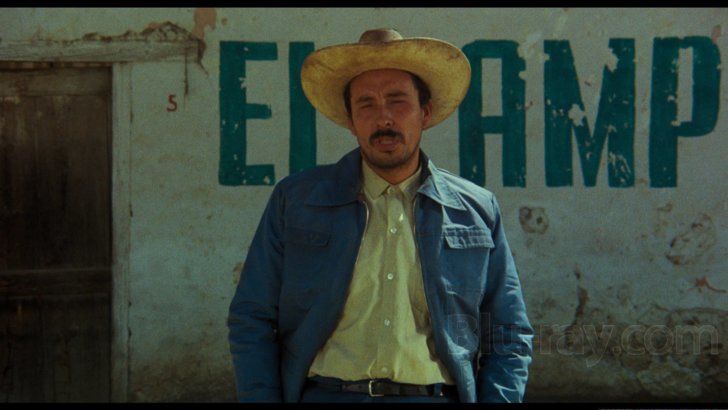
This very disturbing film from veteran director Felipe Cazals chronicles a true event that occurred during the late '60s at a time when a lot of people in Mexico apparently felt abandoned and betrayed by their government. I don't know exactly how accurate the film's reconstruction of the event is, and there seem to be some very different takes on it, but my feeling is that its message isn't at all dated. This makes me wonder how the film is resonating with younger Mexicans because it seems like the dangerous vacuum that it describes now exists on a grander scale and it has attracted some much more powerful players. Criterion's Blu-ray release of Canoa: A Shameful Memory is sourced from an outstanding new 4K restoration of the film, and it includes a very interesting filmed conversation between Felipe Cazals and Alfonso Cuaron. RECOMMENDED.
Similar titles
Similar titles you might also like

Amores Perros
2000

Heli
2013

The Virgin Spring
Jungfrukällan
1960

Hitch-Hike
Autostop rosso sangue
1977

The Housemaid
하녀 / Hanyo
1960

Sympathy for Mr. Vengeance
Ultimate Revenge Edition
2002

Lady Vengeance
Sympathy for Lady Vengeance | Ultimate Revenge Edition | 친절한 금자씨
2005

Insiang
1976

Victoria
2015

The Color of Lies
Au coeur du mensonge
1999

Gomorrah: Season One
Gomorra - la serie
2014

Judex
1963

La Cérémonie
1995

The Major
Майор
2013

Alambrista!
ˇAlambrista! / The Illegal
1977

Highway Patrolman
El patrullero
1991

Los Olvidados
The Young and the Damned
1950

Razzia sur la chnouf
Raid on Drugs
1955

Sin Nombre
2009

Le Trou
1960
